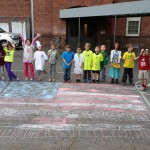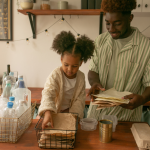Do you want to cover your child’s ears every time a political commercial comes on the television? Their eyes when you see obscene sentiments on campaign t-shirts or bumper stickers? And maybe even their mouths when they ask why a candidate would “say something like that?”
This historically negative campaign has parents all over the country spooked about how to talk about it with their kids.


The campaign has been a bubbling cauldron of accusations of lying, illegal cover-up, corrupt leadership, and inappropriate touching, as well as name-calling and implicit threats. A campaign where presidential debates should be rated at least PG-13. And it’s virtually impossible to shield your kids from it. Like pumpkin spice-flavored anything, it’s seemingly everywhere – especially online. A quick one-minute search of the app store yields no fewer than 50 games featuring the candidates and their antics.
So if you can’t avoid the haunted corn maze that is this election cycle, how do you usher your children through it the least scary way possible?
First off, don’t bury your head in the sand. Instead, see the campaign as a learning opportunity. Pay attention to people’s language, to campaign signs, to newspaper headlines.

Watch political coverage with your kids, and if you can, pause the TV and talk about it, says parenting expert Dr. Deborah Gilboa. Ask your children what they think of what they just saw and heard. What does it make you think of the candidate/politician/commentator? Does it make you admire him or her?
“Kids like co-viewing with us, and getting to voice their own opinions and to say, ‘Oh is that why you say insulting or lying is bad?’” explains Dr. Gilboa, a family physician and mom of four boys.
 By all means, call out politicians if you feel they are behaving badly. Use it as an example of what not to do. If you don’t, kids can take that as permission to act the same way.
By all means, call out politicians if you feel they are behaving badly. Use it as an example of what not to do. If you don’t, kids can take that as permission to act the same way.
Parents and grown-ups are indeed the biggest influencers on children…and that can be both treat and trick.
“The good news is, we have a lot of power. The bad news is, we have a lot of power,” says Dr. Gilboa.
Take a look in the mirror and see how you behave. Do you react to the latest campaign trail revelations by yelling some choice colorful words at your screen? Take a deep breath before you say anything. Watch your language. Your kids are watching, and will echo your actions and reactions.
Listen to them and their opinions with respect, even if you have to bite your tongue – it teaches them to do the same. Talk about what it means to take the high road, and if you are disillusioned or disenchanted with the whole process, try to slip on a mask, and not show it too much.
“The bigger the disappointment we feel and express, the bigger the barrier they feel to being able to make change,” Dr. Gilboa says.
And it is certainly a privilege to be in a country where people can make an impact – that’s not true everywhere. So talk to them about how wonderful it is to be an American, and what a great opportunities elections are – even if they are this gruesome.

Ask them what kind of country they want to live in, and encourage them to try to effect change by questioning, arguing, writing, and protesting. It teaches them to believe in their own effectiveness…that their voices have value. And if they do support a candidate, ask why. What do they like about him or her? Why do they think that candidate is the best choice for our country?
“Every time we ask our kids why they’re making a choice – any choice – we make them stronger citizens,” says Dr. Gilboa.
That’s what we all want, right? To help our kids become stronger citizens and patriots.
(Let’s just hope we don’t need that strength to fight off a zombie apocalypse the next election cycle!)
Boot Campaign is a national non-profit, non-partisan charity dedicated to promoting patriotism, awareness, and assistance to current and former military service members and their families.












